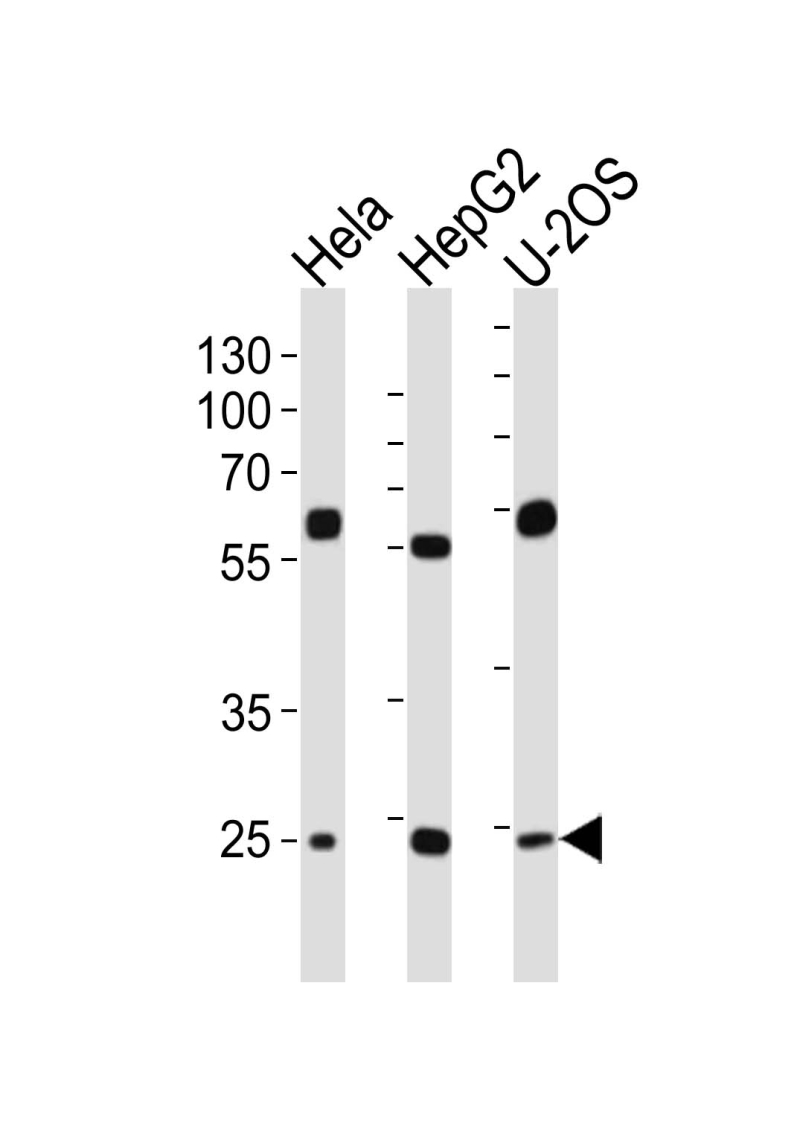
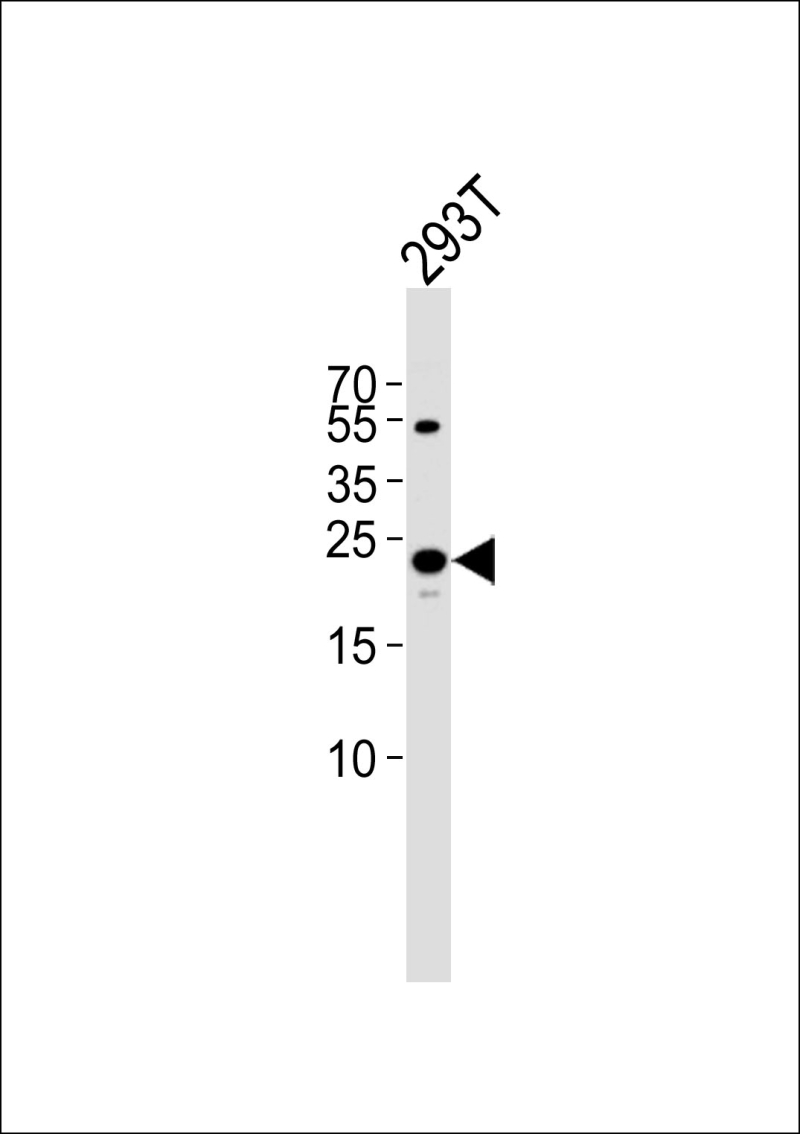
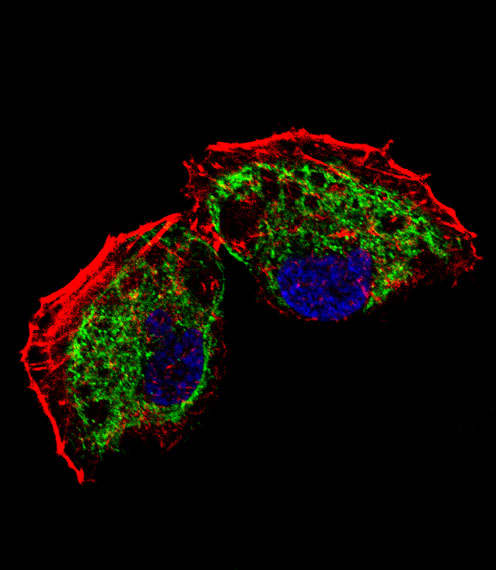
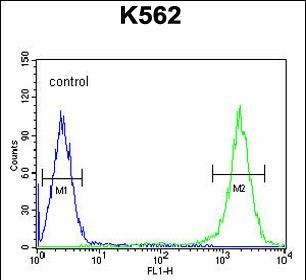
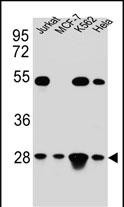
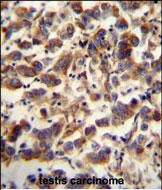
| WB | 1/1000 | Human,Mouse,Rat |
| IF | 咨询技术 | Human,Mouse,Rat |
| IHC | 1/100-1/500 | Human,Mouse,Rat |
| ICC | 1/10-1/50 | Human,Mouse,Rat |
| FCM | 1/10-1/50 | Human,Mouse,Rat |
| Elisa | 咨询技术 | Human,Mouse,Rat |
| Aliases | Transcription factor A, mitochondrial, mtTFA, Mitochondrial transcription factor 1, MtTF1, Transcription factor 6, TCF-6, Transcription factor 6-like 2, TFAM, TCF6, TCF6L2 |
| Entrez GeneID | 7019 |
| WB Predicted band size | 29.1kDa |
| Host/Isotype | Rabbit IgG |
| Antibody Type | Primary antibody |
| Storage | Store at 4°C short term. Aliquot and store at -20°C long term. Avoid freeze/thaw cycles. |
| Species Reactivity | Human |
| Immunogen | This TFAM antibody is generated from rabbits immunized with a KLH conjugated synthetic peptide between 216-246 amino acids from the C-terminal region of human TFAM. |
| Formulation | Purified antibody in PBS with 0.05% sodium azide. |
+ +
以下是3篇关于TFAM抗体的参考文献(示例格式,非真实文献):
---
1. **文献名称**: "TFAM regulates mitochondrial transcription and genome integrity"
**作者**: Kang, D. et al.
**摘要**: 研究利用TFAM特异性抗体通过Western blot和ChIP-seq技术,揭示TFAM在维持线粒体DNA稳定性及调控转录中的核心作用,证实其缺陷导致细胞能量代谢异常。
2. **文献名称**: "Antibody-based analysis of TFAM in neurodegenerative disease models"
**作者**: Smith, J.L. & Patel, R.
**摘要**: 通过免疫组化和免疫荧光技术,使用TFAM抗体检测阿尔茨海默病小鼠模型中线粒体TFAM蛋白表达下降,提示其与神经元退行性变的关联。
3. **文献名称**: "Validation of a high-specificity TFAM monoclonal antibody for flow cytometry"
**作者**: Chen, H. et al.
**摘要**: 报道一种新型TFAM单克隆抗体的开发与验证,该抗体可用于流式细胞术定量分析免疫细胞亚群的线粒体生物合成水平,为代谢研究提供工具。
---
注:以上为模拟示例,实际文献需通过PubMed/Google Scholar检索关键词(如“TFAM antibody application”、“TFAM mitochondrial antibody”)获取。
The TFAM (Mitochondrial Transcription Factor A) antibody is a crucial tool in studying mitochondrial biology and associated diseases. TFAM, encoded by the nuclear genome, is essential for mitochondrial DNA (mtDNA) maintenance, compaction, and transcription. It regulates mtDNA replication by organizing the mitochondrial nucleoid structure and facilitating interactions between replication/transcription machinery. Dysregulation of TFAM is linked to mitochondrial disorders, metabolic syndromes, neurodegenerative diseases (e.g., Alzheimer’s, Parkinson’s), and cancer, making it a key research target.
The TFAM antibody enables detection and quantification of TFAM protein levels in techniques like Western blotting, immunofluorescence, and immunohistochemistry. It helps investigate TFAM’s role in mitochondrial dynamics, apoptosis, mitophagy, and cellular stress responses. Researchers use it to explore tissue-specific TFAM expression, mitochondrial biogenesis in metabolic tissues (e.g., muscle, liver), and its interplay with signaling pathways like PGC-1α. Commercial TFAM antibodies are typically raised against conserved epitopes, validated for specificity across human, mouse, and rat models.
This antibody is vital for advancing understanding of mitochondrial dysfunction mechanisms and potential therapeutic strategies for diseases involving mtDNA instability or energy metabolism defects.
×